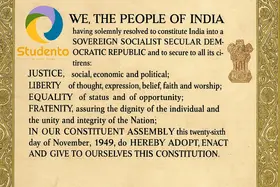

The Preamble of the Indian Constitution stands as a profound reflection of India’s philosophy, values, and democratic aspirations. It encapsulates the guiding principles envisioned by the Constituent Assembly (1946–1949) and serves as the moral compass of the nation’s constitutional framework. For students and aspirants preparing for competitive exams like UPSC or State PCS, understanding the significance, nature, and amendability of the Preamble is essential to grasp the spirit and essence of the Indian Constitution.
The Preamble serves as the gateway to the Constitution, expressing the purpose, philosophy, and intent behind its creation. It mirrors the Constituent Assembly’s vision for a sovereign, democratic, republic founded on justice, liberty, equality, and fraternity.
The Preamble encapsulates the ideological vision of India’s founding fathers, portraying their dream of a just and inclusive nation based on democratic ideals.
The Preamble reflects India’s fundamental political, moral, and spiritual ideals and represents the conscience of the Constitution. It draws inspiration from global democratic charters while maintaining its unique Indian identity.
Various jurists and scholars have celebrated the Preamble’s enduring symbolism and its role as the moral preface to the Constitution.
The question of whether the Preamble forms a part of the Constitution sparked significant constitutional debate and judicial interpretation over decades.
Initially, the Supreme Court in the Berubari Union Case (1960) held that while the Preamble is valuable for interpretation, it is not an enforceable part of the Constitution. However, this stance evolved over time as the judiciary re-examined its constitutional role.
The Preamble, though non-justiciable, provides the spirit and framework within which the Constitution must be read. It was enacted after finalizing the rest of the Constitution to ensure full consistency.
The issue of whether the Preamble can be amended has been a matter of great constitutional importance, clarified through landmark judgments.
In this historic case, the Supreme Court examined if the Preamble could be amended under Article 368. The petitioner argued that even if it was part of the Constitution, its basic structure cannot be altered.
This amendment stands as the only instance when the Preamble was modified. The 42nd Amendment introduced the words Socialist, Secular, and Integrity, reinforcing the inclusive and unified nature of India.
The Preamble of the Indian Constitution acts as the philosophical heart and guiding light of the entire constitutional edifice. It embodies the vision of the Constituent Assembly, the essence of justice, liberty, equality, and fraternity, and remains a vital interpretative tool. For students and civil service aspirants, it serves as the starting point to understand the spirit, evolution, and enduring relevance of the Indian constitutional framework.

Please login to comment and rate.